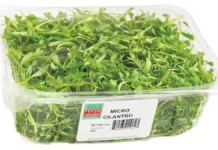Anthony Leone of Energy Kitchen chatted with Total Food Service about his philosophy behind his successful new restaurant and where he sees the franchise headed.
What’s the philosophy behind Energy Kitchen?
The key part of our philosophy is that every item we sell is less than 500 calories. We don’t fry anything; everything we cook is either grilled, baked, or steamed. The look and feel of the stores has to be congruent with the healthy food we’re selling. We want to remove the temptation to unhealthy eating. We serve only low-calorie beverages. No regular Coke, only diet. And we do all of that without sacrificing taste.
Even places like Burger King and Taco Bell have tried to introduce healthier options lately. How do you differentiate yourself from other fast food places with healthy options?
A lot of those restaurants have introduced salads and things like that, but then they pair those salads with high-calorie dressings and sodas. So even if you go into those places with a focus on healthy eating, you’re still consuming a significant number of calories. Sure, it’s better for you than a burger and fries, but we can still do better.
Do you see it as one of your goals to curb the obesity epidemic?
We certainly think there’s an opportunity there. Two-thirds of us are overweight, one-third obese, and I think there’s increasing awareness of the problem. Already we’ve got mandatory calorie-posting laws in New York and California, and it’s only a matter of time before that becomes a nationwide thing. So we think that’s a growth industry right now, and we want to be the pioneer and leader in the healthy fast casual segment.
At your restaurants, you served baked fries instead of fried French fries. Do you really think you can convert people to your healthier option?
Absolutely. Palates change over time. I like to compare it to drinking wine: when people first start drinking wine, they’re more than happy with something like a White Zinfandel, but then their tastes mature and they start drinking more Cabernets and Merlots. We think we can be an industry leader and change people’s tastes. That’s our mission. If you’d told people 15 years ago that you could make a lot of money selling vitamins in water, they’d say that you’re crazy. Now every 16-year-old is drinking Vitamin Water every day.
As every parent knows, kids can be incredibly finicky eaters. How do you get them to eat a different kind of french fry?
We think that we can raise kids to prefer our baked french fry. I’ve got an eight year old and a five year old, and they eat at my restaurants all the time and they love the burgers and fries. We make healthy food delicious without adding calories, and that appeals to diners of all ages. We’re confident that we can change America’s eating habits for the better.
It often seems that the major food vendors charge a premium for healthy products, and that the food they sell cheaper is the food that’s not good for you. How do you keep your prices reasonable while also making a profit on healthy food items?
Obviously, we want to make a profit, but our primary mission is to change the way America eats. The better you eat, the better you feel, and the more successful you’re going to be. That’s what we want to provide, and our vendors understand that. We only go out to bid once a year, so we have a full year to build relationships with our vendors and get the best products possible at the cheapest prices for our customers. They see that we’re successful, and that we’re expanding, and they want to build relationships with us. It allows them to stand with us in our quest to make America healthier.
You mentioned that some of your stores are company-owned and some are franchised. What are the pros and cons of each of those approaches?
I think we’d like to have a roughly even split between franchise and company stores. The good thing about corporate stores is that you control everything. You have a manager that’s not performing effectively, you let them go. But the downside is that you grow slower, because you only have so much money in your pockets. With a franchise, you grow using other peoples’ money, so you can expand much more quickly, but you have less control. If the store is poorly run, it takes a lot more time and money to turn it around.
What’s your approach to building a management team?
Hiring people with the right attitude is crucial. I’ll hire attitude over skills all day long. But it’s also important to hire people with experience in the food industry. Food is a unique business. There’s a lot to manage: vendors, employees, customers. So we look for people who have already been successful in other food service environments, and then we educate them and make them our own.
You’ve worked with Michael Pauley for many years. How has his vision helped you grow the company?
He’s one of a kind, a magical visionary. I’m blessed to have him as a partner. He comes in every week to talk strategy with my vice-president and me. Because he’s not here every day, he brings a more consumer-oriented perspective, which really helps us see the big picture.
What are the dynamics of being successful in Manhattan, and how does that differ in White Plains or in Hoboken?
New Yorkers want to eat very quickly, they have a half-hour for lunch, but they also have a lot more options that will accommodate that half-hour lunch. The suburban customers are much more willing to wait for their lunch. We can also open larger locations in the suburbs, and our suburban locations also have much smaller delivery operations.
How does your commitment to healthy living influence other parts of your business? Do you have any sort of sustainability agenda?
We try to go green wherever we can. We print on recycled paper, we use soy ink. Our packaging is made from sugar cane. We install LED lighting wherever we can in our stores. We’ve worked out an arrangement with ConEd to use only green energy–solar and wind. It means we spend a little more on our overhead, but it’s important to us. It’s part of our healthy-living brand.
What is your approach to advertising your business?
We’re all over social media. We’re on Facebook, Twitter, and Foursquare. We have a full-time advertising director whose primary focus is social media.
We do a small amount of print advertising, and we’ve considered doing some radio and television advertising at some point in the future, but a lot of our focus is social media publicity.
What was your approach to selecting an equipment package for your locations?
We wanted the best equipment, but it was also important to us to have time-saving equipment. We needed our ticket times to be as short as possible, so we needed to be able to cook food fast. We went with a Lang Grill because it has radium heat up top, which cooks food quickly, and also seals in flavor and juices. We also use Merry Chef ovens to bake our fries. Most “baked” fries are actually pre-fried, and only finished off in an oven. We bake our fries every step of the way, so it was important to us to buy a piece of equipment like the Merry Chef that would allow us to do that.
What’s your approach to finding locations? Do you have multiple brokers?
We use one broker in each market. We really value having one person to deal with, and being able to build a relationship with them.
Do you see potential for institutional applications of the Energy Kitchen concept? Universities, airports, places like that?
Absolutely. We just opened up our first school location, at St. John’s University in Queens. There are tons of focus groups that show that students are looking for healthier meal options. So that was just a matter of the administration of St. Johns listening to their student body. I also think airports would be tremendous. It’s very difficult to find food in airports that’s both healthy and inexpensive, and I think an airport operation would be very profitable.























